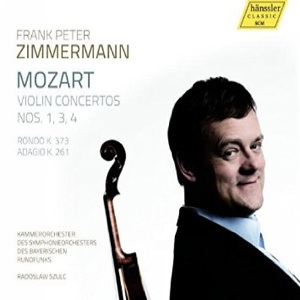Frank Peter Zimmermann is an excellent violinist, and an ideal Mozart interpreter. His rhythms are clean and crisp, his ornamentation appropriate, his vibrato always tasteful and expressive, and the tempos he and conductor Radoslaw Szulc adopt well-nigh ideal. Indeed, Mozart seems to represent the dividing line between successful historically informed and modern violin performance, with the former usually sounding dismal and the latter almost invariably proving satisfactory, at a minimum. This is ironic because, as we know, Mozart’s dad wrote the major 18th-century treatise on violin playing, and it’s amusing to hear performances that claim to follow Leopold’s rules come out sounding like dreck, as they so often do.
Naturally there are a few exceptions to this trend, but they tend to be few and far between. Much of the reason, undoubtedly, stems from the fact that all of the greatest modern violinists, among whom Frank Peter Zimmermann is certainly one, play Mozart; and they are, to a man (or woman) superior simply as players to just about any period-instrument specialist that you would care to name. Interpretive excellence trumps early-music performance practice dogma any day. The best modern players also use finer-toned, more “authentic” violins. These obvious points often get lost in the hype that characterizes so much of our contemporary musical life, but the evidence is plain for anyone with ears to hear it.
This very well-filled disc is the first in a pair featuring Mozart’s complete music for violin and orchestra. Zimmermann plays Mozart’s winsome melodies with the purity and elegance that they demand. The slow movements–that gorgeous tune in the Adagio of the Third Concerto as well as the Adagio K. 261–are exquisite, and Szulc accompanies just as sensitively. Zimmermann also plays the quick music with a real sense of joy. The simplicity and lack of technical bravura in the Rondeau finale of Concerto No. 4, which can easily turn dull, never sounds facile or rhythmically slack in this interpretation.
In a word, this is Mozart the way Mozart ought to be played, and the program is also very well engineered. I look forward eagerly to the conclusion of this cycle.
































